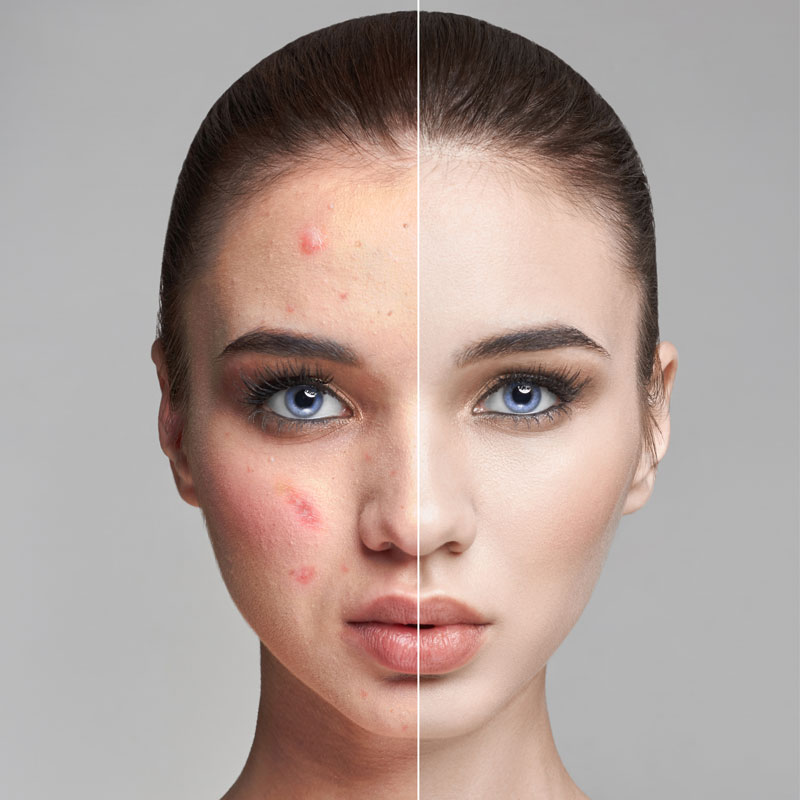Conditions
-
 PsoriasisRead MorePsoriasis is a chronic skin condition that causes cells to build up and form dry, itchy patches on the skin, nails, and joints. This autoimmune disorder causes the skin to grow faster than usual, and although psoriasis is a long-term disease that affects approximately 125 million individuals worldwide, there is no existing cure.
PsoriasisRead MorePsoriasis is a chronic skin condition that causes cells to build up and form dry, itchy patches on the skin, nails, and joints. This autoimmune disorder causes the skin to grow faster than usual, and although psoriasis is a long-term disease that affects approximately 125 million individuals worldwide, there is no existing cure. -
 VitiligoRead MoreVitiligo is a chronic skin condition that causes loss of skin color in segmented areas of an individual’s body, including inside of the mouth, hair, face, hands, genital area, and more. Vitiligo, also called leukoderma, affects over one percent of the world’s population, and its symptoms may worsen with time. Although there is no cure for Vitiligo, treatments available may help restore color to the affected skin.
VitiligoRead MoreVitiligo is a chronic skin condition that causes loss of skin color in segmented areas of an individual’s body, including inside of the mouth, hair, face, hands, genital area, and more. Vitiligo, also called leukoderma, affects over one percent of the world’s population, and its symptoms may worsen with time. Although there is no cure for Vitiligo, treatments available may help restore color to the affected skin. -
 AcneRead MoreAcne, a widespread skin condition, is caused by a combination of factors, including excess sebum (oil) production, clogged hair follicles, bacteria (particularly Propionibacterium acnes), and inflammation.
AcneRead MoreAcne, a widespread skin condition, is caused by a combination of factors, including excess sebum (oil) production, clogged hair follicles, bacteria (particularly Propionibacterium acnes), and inflammation. -
 DermatitisRead MoreDermatitis is a chronic skin condition often caused by allergies, irritants, and genetic factors. Although its symptoms can come out rather quickly, even mild cases of dermatitis can take a few weeks to resolve, and more severe issues usually require long-term management.
DermatitisRead MoreDermatitis is a chronic skin condition often caused by allergies, irritants, and genetic factors. Although its symptoms can come out rather quickly, even mild cases of dermatitis can take a few weeks to resolve, and more severe issues usually require long-term management. -
 EczemaRead MoreEczema, or atopic dermatitis, is a long-lasting skin condition that leads to dry, red, itchy, and bumpy skin. In severe cases, Eczema can lead to painful blisters and ooze liquid. Unfortunately, there is not any clear evidence identifying what causes Eczema.
EczemaRead MoreEczema, or atopic dermatitis, is a long-lasting skin condition that leads to dry, red, itchy, and bumpy skin. In severe cases, Eczema can lead to painful blisters and ooze liquid. Unfortunately, there is not any clear evidence identifying what causes Eczema.
1-844-551-1946
Monday – Friday 9 am – 5 pm EST
-
Yes. UVB phototherapy is considered safe when used as directed and under medical supervision. Side effects are usually mild, such as temporary redness or dryness of the skin.
-
Yes. UVB phototherapy devices are FDA-cleared for the treatment of certain skin conditions, including psoriasis, vitiligo, and eczema.
-
Home UVB phototherapy can significantly reduce costs compared to repeated in-office treatments. Savings vary depending on insurance coverage and the number of sessions needed, but many patients find home treatment much more affordable in the long run.
-
UVB phototherapy can help with psoriasis, eczema, vitiligo, and certain types of skin lymphoma by reducing inflammation and improving skin appearance.
-
Most patients begin noticing improvement after 2–3 sessions per week for 4–8 weeks, though results vary depending on the condition, severity, and skin type.
-
In many cases, yes. UVB phototherapy can be combined with certain topical creams or medications. However, it’s essential to follow your dermatologist’s guidance to avoid potential interactions.
-
On average, UVB bulbs last between 500–1,000 hours of use. With regular treatments, this usually translates into many months or even years before replacements are needed.

